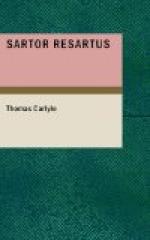Bookseller to Editor.—“Allow me to say that such a writer requires only a little more tact to produce a popular as well as an able work. Directly on receiving your permission, I sent your MS. to a gentleman in the highest class of men of letters, and an accomplished German scholar: I now enclose you his opinion, which, you may rely upon it, is a just one; and I have too high an opinion of your good sense to” &c. &c.—Ms. (penes nos), London, 17th September, 1831.
II. CRITIC OF THE SUN.
“Fraser’s Magazine exhibits the usual brilliancy, and also the” &c.
“Sartor Resartus is what old Dennis used to call ’a heap of clotted nonsense,’ mixed however, here and there, with passages marked by thought and striking poetic vigor. But what does the writer mean by ’Baphometic fire-baptism’? Why cannot he lay aside his pedantry, and write so as to make himself generally intelligible? We quote by way of curiosity a sentence from the Sartor Resartus; which may be read either backwards or forwards, for it is equally intelligible either way: indeed, by beginning at the tail, and so working up to the head, we think the reader will stand the fairest chance of getting at its meaning: ’The fire-baptized soul, long so scathed and thunder-riven, here feels its own freedom; which feeling is its Baphometic baptism: the citadel of its whole kingdom it has thus gained by assault, and will keep inexpugnable; outwards from which the remaining dominions, not indeed without hard battering, will doubtless by degrees be conquered and pacificated.’ Here is a"...—Sun Newspaper, 1st April, 1834.
III. NORTH—AMERICAN REVIEWER.
... “After a careful survey of the whole ground, our belief is that no such persons as Professors Teufelsdrockh or Counsellor Heuschrecke ever existed; that the six Paper-bags, with their China-ink inscriptions and multifarious contents, are a mere figment of the brain; that the ‘present Editor’ is the only person who has ever written upon the Philosophy of Clothes; and that the Sartor Resartus is the only treatise that has yet appeared upon that subject;—in short, that the whole account of the origin of the work before us, which the supposed Editor relates with so much gravity, and of which we have given a brief abstract, is, in plain English, a hum.
“Without troubling our readers at any great length with our reasons for entertaining these suspicions, we may remark, that the absence of all other information on the subject, except what is contained in the work, is itself a fact of a most significant character. The whole German press, as well as the particular one where the work purports to have been printed, seems to be under the control of Stillschweigen and Co. —Silence and Company. If the Clothes-Philosophy and its author are making so great




